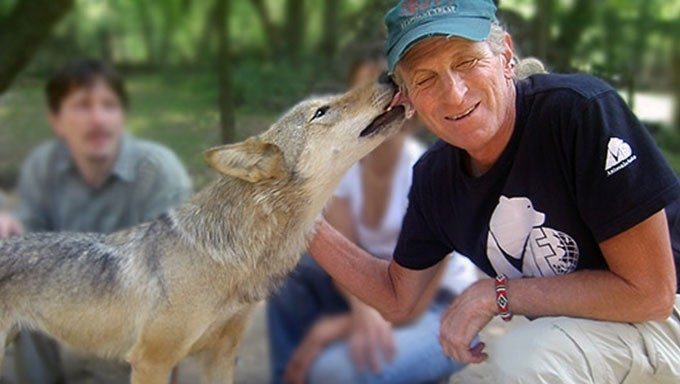The lion shall lie down with the lamb. This poignant image of love and harmony between two of God’s precious creatures comes to us from the Bible and imparts a vision of universal peace. Taken from the sixth verse in the 11th chapter in the book of Isaiah, it states in full, “The wolf will live with the lamb, the leopard will lie down with the goat, the calf and the lion and the yearling together; and a little child will lead them.”
The scientific world is increasingly relaying information to us about the noble qualities of our animal co-inhabitants. Dr. Marc Bekoff, an award-winning vegan ethologist (a scientist who studies the natural behavior of animals) has for the last four decades played a leading role in this important movement. Professor Emeritus of Ecology and Evolutionary Biology at the University of Colorado, Boulder, USA and a Scholar-in-Residence at the University of Denver Graduate School of Social Work’s Institute for Human-Animal Connection, Dr. Bekoff confirms that like humans, animals exhibit a sense of fairness.
The foundation for such an idyllic paradise as is portrayed in Isaiah is surely the recognition that species other than humans also possess noble and selfless qualities. Indeed, humans are beginning to see that some of our negative stereotypes regarding animals are untrue. Dr. Bekoff’s significant contribution is based on studying the natural behavior of animals. In observing animals at play, for example, he has made insightful discoveries about their sense of morality.
Although play is fun, it’s also serious business because vigorous play could possibly lead to injury. Therefore, it is important for canines and other playful animals to state clearly what they want and expect. Dr. Bekoff found that there are four basic aspects of fair play in animals which can be outlined as followed: Ask first, be honest, follow the rules, and admit you’re wrong. Dr. Bekoff notes that animals at play are constantly working to understand and adhere to the rules, and to communicate their intentions to play fairly.
When it comes to inviting a fellow dog to play, a pooch will give a number of signals. One is a ‘play bow,’ where the dog bows on his forelegs and puts his hind legs up wagging the tail, all of this often accompanied by a bark. You might want to look for the signals next time you are around fun-loving canines!
According to Dr. Bekoff, such behavior is a kind of moral agreement to play with each other and not to do harm. He notes that this sense of fairness extends beyond dogs and other canine family members such as coyotes and wolves, to include hyenas, great apes, monkeys and rats.
Dr. Bekoff is sharing the message with humans that animals have a lot to teach us. By studying the details of social play in domestic dogs and wild canids (includes wolves, jackals, hyenas, coyotes, and foxes), we are able to learn a lot about the evolution of human empathy and fairness — and discover behaviors that give hints to the roots of human morality.
Dr. Bekoff has stated that cooperation and caring have been determining factors in the course of evolution. He has also cited research showing that over 90 percent of the social interactions of nonhuman primates are based on affiliation or cooperation. Moreover, Dr. Bekoff has added, “Social animals live in groups structured by rules of engagement—there are “right” and “wrong” ways of behaving, depending on the situation.”
Dr. Bekoff has authored a number of books about goodness and empathy and how they relate to fairness and moral behavior in our fellow creatures. The books include The Emotional Lives of Animals and The Animal Manifesto: Six Reasons For Expanding Our Compassion Footprint. He has also co-written a number of books including those with famed conservationist and primatologist Dame Jane Goodall and bioethicist and writer Dr. Jessica Pierce. In addition, he is author of an insightful column in Psychology Today entitled Animal Emotions.
Dr Bekoff’s rich research has led him to believe that both animals and humans are by nature kind, compassionate and empathetic. He gives many examples in the animal world, such as that of a group of elephants he was privileged to personally meet while in Kenya. The family herd lovingly cared for a crippled member of the group, a female named Babel. Her family of elephants brought her food and fed her tenderly. They stayed by her and protected her, waiting as she moved very slowly due to an injured right leg.
Dr. Bekoff has stated: “Compassion begets compassion and that there is an ever-growing compassion umbrella that encompasses or embraces many different species including humans. So, when we’re nice to other animals and empathize compassionately with their physical and mental health, we’re also spreading compassion to other people.“
Climate change, on the other hand, represents a global danger to humans and animal species. Dr. Bekoff states that if we fail to take care of other animals and the Earth, the losses will be huge as we are on the brink of numerous irreversible depletions to magnificent webs of nature. Our wholeness and that of the world at large is in peril and requires immediate action.
In order to stay positive and loving and continue his work, Dr. Bekoff, ever the student of animals, finds inspiration in knowing and observing them. He cites the example of Jasper, a recovered Asiatic moon bear whose example filled him with humble hope. For after years of horrific suffering, Jasper responds to humans with forgiveness, peace and trust. Such generosity of spirit in the animal kingdom is a source of encouragement for Dr. Bekoff, who works tirelessly to promote the idea of ‘compassionate conservation’ among human beings. The first premise of compassionate conservation is to refrain from doing any harm, while the second is that individual lives count.
Dr. Marc Bekoff is himself an inspiration to countless others. Over the course of past centuries, heartless experiments on animals have been condoned in the name of science. Through his life’s work Dr. Bekoff richly illustrates that we can study and learn about the natural world and our fellow co-inhabitants on the planet without harming them. Indeed, it is only through kind and compassionate ways of being that we can evolve in order to protect the web of life on our planet. We are grateful for Dr. Beckoff’s immense love and wise scientific leadership, helping us to usher in an age of blissful harmony between all beings.
For more information visit: http://www.literati.net/authors/marc-bekoff/
To purchase his books: visit www.amazon.com
 The Supreme Master Ching Hai
The Supreme Master Ching Hai


